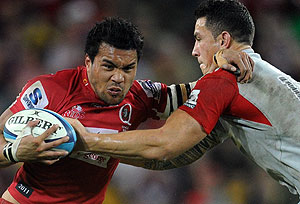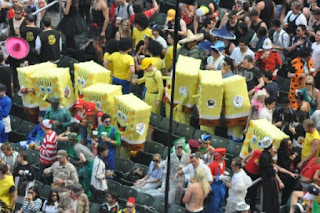Although southern hemisphere rugby is over for 2011, rugby and league fans downunder can still get their fix by watching American football, otherwise known as gridiron, where the standard of athleticism and football is outstanding. Take a look at the incredible attacking game of the Oregon Ducks in these highlights from their recent game against Washington State:
Thankfully rugby never took off in the USA, because if it did the existing rugby playing nations would have no hope of matching them. There are enough athletes of sufficient standard in the Oregon college team to fill most of the places in the Wallabies!
This type of hit occurs when a defender aims his helmet into the head of another player, usually the player carrying the ball. This is the equivalent of a “deliberate high shot” in rugby or league. But its worse than that, because the weapon is harder.
Although there are more more 'blow-out' scorelines, it could be argued that the college games are better to watch than the NFL. Similar to the difference between the style of rugby played at the world cup and that played in SuperRugby, in American college football the defenses are not as tight as in the NFL, allowing offense to dominate the game, with the resultant spectacle of exhilarating running and passing plays.
The pomp and ceremony at the college games is mind-boggling, particularly to anyone who has experienced the muted atmosphere at sporting fixtures in Australian universities. At American college football games, crowds of 80,000 are the norm, with incredible pageantry, marching bands, and nation-wide television coverage.
Perhaps because the athletes are ‘amateur’ and there is a greater emphasis on fair play, ethics, and morality, college games are not blighted as much by the ugly spectacle of helmet to helmet hits, which are seen in almost every NFL game.
In the recent Patriots v Steelers game, I was disturbed to witness numerous deliberate helmet to helmet hits which were not mentioned by the commentators, even though clearly visible on slow motion replays. Perhaps fearful that highlighting these hits would draw attention to the endemic nature of the problem, leading to a ratings backlash, TV commentators mostly turn a blind eye to it. Or are they catering to a macabre streak in the viewing public that wants to see it?
Research carried out amongst retired American football players has found a direct correlation between concussion and a variety of neurological disorders, including early onset dementia. Although there is growing support to rub helmet to helmet hits out of the game, the best the authorities have managed so far is to apply penalties with qualifications.
One such stipulation is that to be penalised, the contact must occur on a so-called “defenseless” player. Clearly this is absurd, because the focus should be on the actions of the player that leads with the head, not the recipient. Whether the recipient is deemed defenseless or not is irrelevant when concussed by a fibreglass, steel, and bone missile mounted on the top of 120kg of rippling muscle running at full pace and aimed directly at his head.
What’s worse is that, in the Patriots v Steelers game, it was noticeable that most of the helmet to helmet shots were coming from one side – the Steelers – indicating that it was a deliberate policy by this team.
A calculated policy designed to intimidate opponents, with the ultimate outcome of brain damage…..
Penalties for these hits, when they occur, are usually fines, which are often paltry compared to the incomes of the players. What is really needed are lengthy suspensions.
Penalties for these hits, when they occur, are usually fines, which are often paltry compared to the incomes of the players. What is really needed are lengthy suspensions.
NFL administrators need to remove this ugly blight on the game. In the meantime, viewers can vote with their remote control by instead getting their football fix from college games.




























